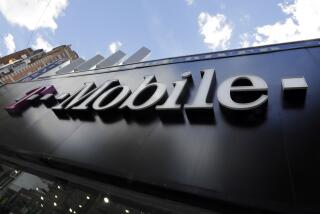MCI, Sprint Match AT&T; Checks
MCI and Sprint are quietly matching the hefty incentive checks their customers are receiving from American Telephone & Telegraph to keep them from switching to AT&T.;
The moves blunt the effect of AT&T;âs campaign for new customers, but at a cost to MCI and Sprint. AT&T; hasnât disclosed how much it is spending, although the total value of checks is believed to run into the millions.
As reported in this column two weeks ago, AT&T; has been mailing non-customers checks for up to $75 as an incentive to take AT&T;âs long-distance service. When people endorse the check, they agree to switch service.
AT&T; has conducted the promotion periodically for several years, but in February it boosted the size of the incentive, a spokesman said. Before that, the checks did not exceed $50.
Neither MCI nor Sprint has publicized that it is matching the incentives.
MCI customers who call that carrierâs customer service department are told they can send the AT&T; checks in for credit on their MCI bills. Sprint customers who telephone customer service receive certificates worth $50 in long-distance service. They donât have to send in their AT&T; checks.
âWe value our customers,â said Cari Sanborn, director of marketing for MCIâs Friends and Family calling program. âIf our customers are taking the time to call and say they want to stay loyal to us, we want to be loyal right back.â
None of the long-distance companies would disclose how many AT&T; checks have been traded in or cashed. âWe havenât really tracked it,â Sanborn said.
*
Snack food riddle: The folks at Frito-Lay have a snack that is fat and thin at the same time.
The snack is Fritos Crisp âN Thin, which, despite its name, contains more fat and calories per ounce than original Fritos.
A comparison of product information on the labels shows that Fritos Crisp âN Thin chips contain nearly 7% more calories and more than 15% additional fat than original Fritos.
We called Frito-Lay to find out what makes these fat chips thin. A spokeswoman explained that, due to differences in the manufacturing process, Crisp âN Thin chips âare lighter, longer and thinner than regular Fritos.â
*
Barney update: The Federal Communications Commission has determined that a PBS fund drive in March that interrupted the popular âBarney & Friendsâ childrenâs program didnât violate federal rules on childrenâs TV.
As previously reported, the FCC received complaints from parents angry about the solicitations, which offered Barney toys or tapes in return for donations. Though toy giveaways arenât new, the Barney solicitations hit a nerve because the purple dinosaur is immensely popular with preschool children.
The FCC said the solicitations didnât violate its rules because Barney himself didnât appear during the televised fund-raisers. FCC rules prohibit TV stations from running commercials for a product or service during a childrenâs program that features that product or service. For example, Teenage Mutant Ninja Turtle toys canât be advertised during the cartoon show.
Nonetheless, PBS stations are taking steps to prevent future controversies. KCET in Los Angeles said it no longer offers toys in return for donations; in the past it has offered Elmo and Cookie Monster from âSesame Street.â A KCET fund-raiser around âBarney & Friendsâ last weekend featured Barney audio and video tapes, raising $11,460 for the station.
âWe view the tape as an extension of the show,â said a KCET spokesman. âWe have decided against anything furry.â
*
Whole-wheat labels: A Washington-based consumer organization plans to ask the government today for a rule requiring that âwhole-wheatâ snacks be made entirely from whole-wheat flour.
The Center for Science in the Public Interest said that such products as Keeblerâs Whole Wheat Club Crackers and Nabiscoâs Ritz Crackers With Whole Wheat are made mostly from refined white flour.
Existing rules mandate only that whole-wheat breads and macaroni products be made from 100% whole-wheat flour. However, a Keebler spokesman said the company recently agreed to drop the word whole from its product labels, after the Food and Drug Administration raised questions. Nabisco referred calls to the National Food Processors Assn., an industry group, which said that âwhole wheatâ referred to taste, not content.
An FDA spokesman said the agency had no comment since it hadnât received the Center for Science in the Public Interestâs petition.
More to Read
Inside the business of entertainment
The Wide Shot brings you news, analysis and insights on everything from streaming wars to production â and what it all means for the future.
You may occasionally receive promotional content from the Los Angeles Times.










